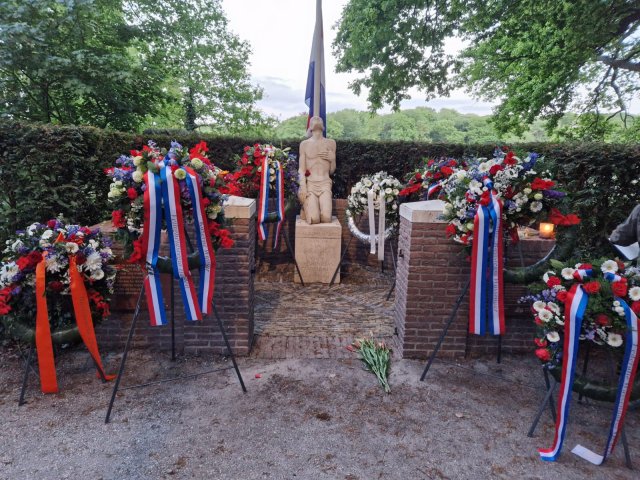Remembrance Sunday, May 4
On Sunday, May 4, a commemoration of the dead took place in Wassenaar at the monument on the Schouwweg. The commemoration began with a silent march to the monument from the corner Nachtegaallaan/Schouwweg. Several invited guests laid a wreath. The commemoration was accompanied by Music Society Excelsior from Wassenaar.
You can read Mayor Leendert de Lange's speech below.

Speech by Mayor Leendert de Lange
Ladies and gentlemen, boys and girls, residents of Wassenaar,
Tonight we are gathered here. In silence. In communion. In remembrance.
In this place, at this monument, we remember those who gave their lives. Civilians, soldiers, resistance fighters - women, men, children - who made the highest sacrifice, in the darkest periods of our history.
We reflect on them, on what they experienced. But we do so not only to look back. We also commemorate because it teaches us something about today. About our own time. About what it means to be free, and how fragile freedom can be.
Over the past few weeks, I have had the opportunity to teach classes at Nuts School and St. Joseph School, to grades 7 and 8. We talked about World War II, about remembrance, and about freedom. And I can tell you: it gave me hope. Because I saw children who genuinely wanted to understand, who asked questions, who felt that it is not just history - but our story.
Because it is. It is the story of Wassenaar. Of our parents, grandparents, neighbors. Of people who lived, hoped, cried, fought and lost in this village.
Wassenaar saw a lot during the war years. The first V2 rocket ever fired at England took off from Lijsterlaan on September 8, 1944. Moments later it crashed into London, with deadly consequences. A second rocket was launched almost simultaneously from the intersection of Koekoekslaan and Schouwweg.
You must imagine: it was a warm summer evening. And suddenly - a deafening roar, fire in the air, panic in the streets. People dived under tables, fled into basements. The unknown made it frightening. It was the beginning of a new chapter in the war - one in which the village itself, Wassenaar, became launching pad for a ruthless weapon. And thus also unwittingly part of the pain across the Channel.
And it didn't stop with that one day. The war touched Wassenaar in countless ways. We think of all those killed on the Waalsdorpervlakte, of the French commandos commemorated annually at the Wassenaar Battle, of the occupation of Valkenburg airfield. Of the food drops at Renbaan Duindigt; like a glimmer of hope in a winter full of hunger.
And we think of the Stolpersteine - those little brass stones in the sidewalk, in front of houses of Jewish fellow villagers who were deported. People with names, faces, lives. It is important that they are there. So that we literally dwell on what happened.
Tonight we remember them as well.
And that remembering goes beyond names. It's about stories. Sometimes big, sometimes small. But always poignant.
Like the story of Mrs. Zwaantje Knuppe-Mulder. In early May 1940 she was hit by a shrapnel from a bomb. She was the first war victim of our village. She was buried on Schouwweg, the cemetery that disappeared in the 1980s.
Or a story closer to myself. My grandmother was walking near the Kerkehout near the end of the war, along the Rijkstraatweg, with the baby carriage in which my father lay as a baby. A fighter plane flew low over and suddenly shrapnel flew around. My grandmother sought cover and shelter in the greenery. Nonetheless, an expose landed in the baby carriage. But ... it fortunately did not go off. What if that had been different? Then I wouldn't be standing here tonight.
Moments like that suddenly bring the war very close.
That is why I am grateful that we have recently been able to renovate the monument on the Schouwweg. And that a new plaque has been placed, doing justice to all the victims from Wassenaar. Through a QR code you can view the book of names. It is a tribute to them - and a way to keep their memory alive.
Because commemoration is more than a ceremony. It is a command. A call. To all of us.
I was struck the other day by a quote from a professor at VU University who researches happiness and well-being. She said:
"Resilience is an essential part of happiness."
And I thought: what a timely, perhaps urgent thought.
Because how resilient are we - as a society, as a village, as human beings?
What do we need to be resilient?
In a time of war near us, of threat, of disinformation, of tensions that permeate our own living rooms.
Maybe it starts with connection.
With seeking each other out.
Let's ask each other the following question:
"What do you need to be resilient?"
As family. As friends. As neighbors. As a community.
Because Wassenaar not only has an eventful history - it also has a strong future. We are blessed with a lot of knowledge, creativity and entrepreneurship. Let's combine those strengths. Let's mobilize our talents. Not only to commemorate - but also to build.
Building bridges instead of walls. Building peace. To resilience. To freedom.
Because freedom can never be taken for granted. It is something people died for. Something for which people raised their voices, left their homes, put their lives on the line.
And we ... we are their heirs.
Let us honor them. By remembering. By telling. And above all: by living in freedom, with responsibility.
So that we never forget.
Thank you.